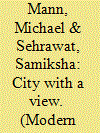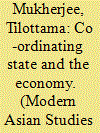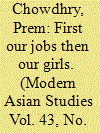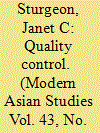|
|
|
Sort Order |
|
|
|
Items / Page
|
|
|
|
|
|
|
| Srl | Item |
| 1 |
ID:
089386


|
|
|
|
|
| Publication |
2009.
|
| Summary/Abstract |
Despite the contemporary importance of the Ridge forest to the city of Delhi as its most important 'green lung', the concept of urban forestry has been explored neither by urban historians studying Delhi nor by environmental historians. This article places the colonial efforts to plant a forest on the Delhi Ridge from 1883 to 1913 within the context of the gradual deforestation of the countryside around Delhi and the local colonial administration's preoccupation with encouraging arboriculture. This project of colonial forestry prioritized the needs of the white colonizers living in Delhi, while coming into conflict repeatedly with indigenous peasants. With the decision to transfer the capital to Delhi in 1911, the afforestation of the Delhi Ridge received a further stimulus. Town planners' visions of a building the capital city of New Delhi were meant to assert the grandeur of British rule through imposing buildings, with the permanence of the British in India being emphasised by the strategic location of the ruins of earlier empires within the city. The principles of English landscape gardening inspired the planning of New Delhi, with the afforestation of the Delhi Ridge being undertaken to provide a verdant backdrop for-the Government House and the Secretariat-the administrative centre of British government in India. Imperial notions of landscaping, which were central to the afforestation of the Delhi Ridge epitomised colonial rule and marginalized Indians.
|
|
|
|
|
|
|
|
|
|
|
|
|
|
|
|
| 2 |
ID:
089382


|
|
|
|
|
| Publication |
2009.
|
| Summary/Abstract |
The economy of eighteenth-century Bengal was closely tied to the political, with the indigenous state, the Nizamat, maintaining a stake in the success of commercial circuits. The Nizamat played a positive role in keeping the structure operative through its patronage and regulating activities. Besides its direct involvement in trade, the article examines the indirect facilitating and co-ordinating role it played, the elaboration of a distinct court culture and the policies it pursued which had a bearing on the health of the economy. The conditions necessary for the functioning of marketing networks-protection of property and enforcement of contract-were maintained. It was a mutually beneficial system with the state with its seat in Murshidabad, the landed élite of the region, and the commercial sector symbiotically tied together.
|
|
|
|
|
|
|
|
|
|
|
|
|
|
|
|
| 3 |
ID:
089383


|
|
|
|
|
| Publication |
2009.
|
| Summary/Abstract |
In the post-colonial shifting of material, legal and ideological bases, some of the given patterns of relationships between individuals and caste groups have changed and weakened because of the introduction of new, parallel and alternative structures of relationships. This change has left the dominant caste groups feeling palpably insecure in relation to the dalits. While delineating this relationship, this article seeks to argue that the cases of dalit and dominant/upper caste members' elopement and marriage represent a high point in the ongoing conflictual relationship between them, as these are viewed as forms of dalit assertion. Although many caste groups and communities are involved in inter-caste marriages and associations that defy customary norms and caste practices and have no social acceptance, it is in relation to a dalit and non-dalit association or marriage that certain aspects, which impinge on wider issues, come to the surface more pronouncedly. For the dominant caste groups such associations remain the most viable and potent issues to garner a wider collective support, cutting across class/caste/community and age divides. These cases are selectively made a public spectacle by the dominant caste groups to settle wider issues at stake verging on contemporary political and economic interests.
|
|
|
|
|
|
|
|
|
|
|
|
|
|
|
|
| 4 |
ID:
089381


|
|
|
|
|
| Publication |
2009.
|
| Summary/Abstract |
The paper attempts to understand the challenges and opportunities which the penal settlement at Port Blair in the Andaman Islands presented to colonial governments in twentieth-century India. To this end, the paper examines a scheme drawn up in the 1920s which saw the introduction of a much more liberal regime for convicts in Port Blair. Under these plans, convicts were granted access to land and encouraged to bring their families from the mainland. This research reveals that the policies which determined the history of the settlement in this period were defined by two tensions. First, there was a constant battle between the central authorities and provincial governments over the shape and purposes of the settlement. Second, there was a contradiction between the penal objectives of the colony and the larger strategies which aimed to develop the islands for the greater British empire.
|
|
|
|
|
|
|
|
|
|
|
|
|
|
|
|
| 5 |
ID:
089385


|
|
|
|
|
| Publication |
2009.
|
| Summary/Abstract |
Mumba-devi- is the patron Goddess of the city of Mumbai, one of the largest and most cosmopolitan cities of Asia. Local traditions say that Mumba-devi- was a Koxs1E37i- Goddess and worshipped by the indigenous Koxs1E37i- fisher community for centuries. However, since the turn of the twentieth century the temple of Mumba-devi- and the rituals surrounding the Goddess have gradually been Sanskritised. Today, Mumba-devi- is more closely associated with the Gujarati community. This paper examines this transformation and in doing so reflects on the survival of Mumba-devi-, the ongoing popularity of Goddess worship in Mumbai and the failure of Hindu fundamentalists to subordinate the Mother Goddesses of Mumbai to a more limited range of Hindu Gods.
|
|
|
|
|
|
|
|
|
|
|
|
|
|
|
|
| 6 |
ID:
089384


|
|
|
|
|
| Publication |
2009.
|
| Summary/Abstract |
First authorised in 1987, local village elections in China have been much studied by China scholars to assess the emergence of democracy in the People's Republic. Elected village committees were to manage 'local affairs', including village lands, as a step towards local self-governance. In place of democracy, this article highlights access and control over natural resources in relation to a local village election first held in Mengsong village, Yunnan, in 2000. A comparison of resource access in 1997 and 2002 shows that over this period, Mengsong villagers lost access to forests, agricultural lands, pastures and mineral resources-'local affairs' that an elected committee might have managed. National and local events from 1998 to 2002 signalled a recalibration of people of high and low 'quality' (suzhi) in China, with Mengsong shifting cultivators emerging as 'low quality' people who threatened China's environment and economic development. These changes in status signified a dramatic shift in who was qualified to manage resources, run local affairs and contribute to China as it entered the World Trade Organisation (WTO) in 2001. The discourse of 'quality' resulted in Akha farmers being blamed, and blaming themselves, for their own poverty and resource loss, deflecting attention from the political economic processes that caused their dispossession. Far from the emergence of democracy, the local village election in Mengsong entailed increased state control over people and resources, as China geared up for environmental protection and engagement with the global economy.
|
|
|
|
|
|
|
|
|
|
|
|
|
|
|
|
| 7 |
ID:
089387


|
|
|
|
|
| Publication |
2009.
|
| Summary/Abstract |
This article discusses the perpetration of Orientalism in the arena of contemporary South Asian literature in English: no longer an Orientalism propagated by Occidentals, but ironically enough, by Orientals, albeit by diasporic Orientals. This process, which is here termed as Re-Orientalism, dominates and, to a significant extent, distorts the representation of the Orient, seizing voice and platform, and once again consigning the Oriental within the Orient to a position of 'The Other'. The article begins by analysing and establishing the dominant positionality of diasporic South Asian women writers relative to their non-diasporic counterparts in the genre, particularly within the last half decade. It then identifies three problems with the techniques employed by some diasporic authors which have exacerbated the detrimental effects of Re-Orientalism; the pre-occupation with producing writing which is recognisably within the South Asian genre, the problem of generalisation and totalisation, and the insidious nature of 'truth claims'.
|
|
|
|
|
|
|
|
|
|
|
|
|
|
|
|
|
|
|
|
|